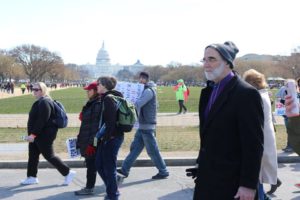
Bishop Mark Beckwith helps lead the Stations of the Cross in Washington D.C. in 2013.
One morning in Holy Week of 2013, 20 Episcopal bishops led praying the Stations of the Cross as they processed along Pennsylvania Avenue from the White House to the U. S. Capitol. It was the first public evidence that bishops across the church were organizing to help stem the tide of gun violence, and it came just three months after the terrible shootings that took the lives of 28 people, including 26 students and educators at Sandy Hook Elementary School. But the seeds of the movement, and of the network that became known as Bishops United Against Gun Violence, had been sown much earlier.
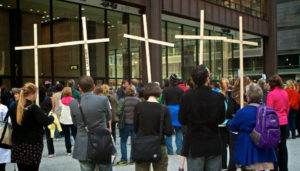
CROSSwalk. Image courtesy of the Diocese of Chicago
During Holy Week in 2012, an initiative called CROSSwalk that began at All Saints’ Episcopal Church under the leadership of the Rev. Bonnie Perry, who is now bishop of Michigan, turned out more than 1,500 people for a four-mile procession across the city in memory of more than 800 young people who had died violently in Chicago since 2008. It marked the beginning of the Episcopal Church’s reawakening to the scourge of gun violence.
Tragic events also conspired to focus the church’s attention. On May 3, 2012, a man walked into the office of St. Peter’s, Ellicott City in the Diocese of Maryland with a gun and killed administrative assistant Brenda Brewington and co-rector the Rev. Dr. Mary-Marguerite Kohn before killing himself.
The church has a long record of General Convention resolutions supporting tighter controls on the sale of guns and ammunition, but a surge of mass shootings in places like Columbine and Aurora, Colorado sparked a new energy for activism. On August 5, 2012, a mass shooting at a Sikh temple in Oak Creek, Wisconsin took six lives and a seventh person died of his wounds in 2020. In the wake of those killings, Bishop Steven Miller of the Diocese of Milwaukee, asked then-Presiding Bishop Katharine Jefferts Schori if the House of Bishops could devote significant time to the issue of gun violence at an upcoming meeting.
The House at that time included gun abolitionists, hunters and former law enforcement officers, but Miller believed its members would be willing to come out of their “silos.”
“The House had gotten to be a place where we could have good conversations,” he says. “Those of us who wanted to do something were not anti-hunting. We were not anti-gun ownership. We just wanted safe, sane gun laws to protect people.” Those policies include universal background checks and closing the gun show loophole.
Jefferts Schori suggested Miller call Bishop Mark Beckwith of Newark, who was working on issues of gun violence in his city. Then on December 14, 2012, a young man, who had already murdered his mother, walked into Sandy Hook Elementary School with an AR-15 rifle.
Bishop Ian T. Douglas of Connecticut was on the phone with Bishop Mariann Budde of Washington when he heard the news that morning, a fact they noted in an op-ed published a year later urging Congress to pass common sense gun legislation. Budde remembers Douglas saying, “We live in difficult times, Mariann,” before he got off the phone to learn the full extent of the tragedy.
The Sandy Hook shooting brought the issue of gun violence, particularly mass shootings, to unprecedented public attention, and a number of bishops and other church leaders responded quickly. Budde and the Very Rev. Gary Hall, then dean of Washington National Cathedral, spoke out quickly, and joined unsuccessful lobbying efforts to pass the Manchin-Toomey bill, which would have expanded the kinds of gun sales subject to background checks. Meanwhile, Miller, Beckwith, Douglas and Bishop Eugene Sutton of Maryland had a conference call in which they began to work out how Episcopal bishops, as a body, might respond to the surge in gun violence.
First Steps: The House of Bishops, March 2013
From that call a gun violence prevention effort began running on three tracks with the bishops of Connecticut—Douglas and suffragan bishops Laura Ahrens and Jim Curry—working on the Stations of the Cross in Washington, Sutton advancing the idea of a national gathering against gun violence and Beckwith, Miller and others lobbying for time to discuss and perhaps organize a response to the rise in gun violence and mass shootings at the next House of Bishops meeting.
Jefferts Schori agreed to include the discussion on the house’s agenda, and members of her staff assisted in the early organizational efforts. The bishops brought on Canticle Communications to help organize and publicize their efforts, and by the March 2013 House of Bishops meeting, a plan was in place.
During their afternoon session on March 8 at the Kanuga Camp and Conference Center in Hendersonville, North Carolina, the bishops heard first from Vincent DeMarco of Johns Hopkins University, national director of Faiths United to Prevent Gun Violence, a network that was forming to lobby for common sense gun safety legislation. DeMarco told the bishops that the church brought four strengths to the struggle against gun violence: moral authority, grassroots presence, the diversity of church membership, and the ability to attract media attention.
The bishops devoted the remainder of the session to hearing personal stories from five of their colleagues whose work and lives had been shaped by gun violence: Budde, Sutton, Ahrens, Jeffrey Lee of Chicago, whose diocese was now leading the CROSSwalk efforts, and Ed Konieczny of Oklahoma, a former police officer, who had had to kill a man in the line of duty. (After the meeting, Konieczny wrote a column about his experience for the CNN website, but it is no longer available online.)
After hearing the stories, the bishops discussed three questions in their table groups:
- What is the ministerial context in your diocese with respect to: gun ownership, gun legislation, gun violence?
- What might you do as a bishop to challenge gun violence in your diocese?
- What might we do together as bishops of The Episcopal Church to challenge gun violence?
When the opportunity arose for further conversation that evening, some 30 bishops gathered. “And that’s when we said, ‘Maybe we should keep this network going,’” Douglas said. “Not as a formal organization, but as a network of bishops asking, ‘How do we support one another as we go about trying to address gun violence in our nation and our dioceses.”
At the close of the meeting, the bishops offered “A Word to the Church: Godly Leadership in the Face of Violence.”
“We respect and honor that we are not of one mind regarding matters related to gun legislation,” the bishops wrote. “Yet we are convinced that there needs to be a new conversation in the United States that challenges gun violence. Because of the wide variety of contexts in which we live and our commitment to reasoned and respectful discourse that holds together significant differences in creative tension, we believe that The Episcopal Church can and must lead in this effort. In fact, many in this Church are already doing so, for which we thank God.”
Going Public: Washington, D. C and Oklahoma City, March 2013-April 2014
The momentum from the House of Bishops meeting galvanized the March 25 Stations of the Cross in Washington, which Douglas, Ahrens and Curry, who had testified before the U. S. House of Representatives Gun Violence Prevention Working Group, organized in collaboration with Budde and the Rev. Mike Angell, then of St. John’s Church, Lafayette Square. The bishops who attended convened at St. John’s to hear a briefing on gun violence legislation from Obama administration officials before taking to the streets for the service.
The following month, Sutton convened a meeting in Baltimore to plan a churchwide conference for Episcopalians interested in issues of gun violence. The emphasis was on creating as big a tent as possible so that bishops in politically conservative and often rural areas would feel comfortable joining with bishops who represented big cities and traditionally liberal areas.
“These weren’t just liberal bishops from the big cities and Chicago getting together,” Sutton said.
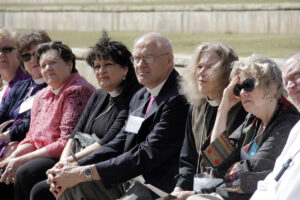
Conference attendees, including Bishop James Curry, bishop suffragan in the Diocese of Connecticut, center, listen as a National Parks Service guide describes the events of the of April 19, 1995, Oklahoma City bombing. Photo: Lynette Wilson/ENS
The event that arose from this planning session, Reclaiming the Gospel of Peace: An Episcopal Gathering to Challenge the Epidemic of Violence, was held in Oklahoma City in April 2014, shortly before the 19th anniversary of the bombing of the Albert P. Murrah Federal Building by two anti-government extremists and white supremacists. The attack took the lives of 168 people, including 19 children, and injured 680.
The gathering, which attracted some 220 people, including 35 bishops, did not focus specifically on issues of gun violence or advocacy for gun violence prevention measures, but on a wider array of issues that give rise to violence. Coincidentally, Archbishop of Canterbury Justin Welby was visiting North America at the time and spoke at the event. (Some of the presentations given at the event were combined with other writings of Episcopal Church leaders in the book “Reclaiming the Gospel of Peace: Challenging the Epidemic of Gun Violence.”)
Claiming Common Ground: Salt Lake City, July 2015
By the end of 2014, the Bishops United Against Gun Violence network included more than 60 bishops, both active and retired. In December of that year, a group of bishops gathered with the Canticle Communications team at the Nicholas Center in Chicago at the invitation of Bishop Jeffrey Lee, to consider how the network should define itself and what it might do next. The group included Beckwith, Konieczny, Miller, Sutton, Bishop Scott Hayashi of Utah, and future bishops Perry and Jennifer Baskerville-Burrows, both of whom were, at the time, priests in the Diocese of Chicago.
“We thought it was very important that we were not an agency of the church, that this is not an official group,” Sutton said. “That has served us well. We have never pretended to be a voice of the whole church. We were a group of leaders who could speak independently. We were acting in our authority as bishops to guard the faith.”
The bishops who gathered recognized that they and their colleagues across the church had numerous demands on their time, and that if the new network was to endure and accomplish anything, it would need a loose leadership team and a few manageable goals.
In conversations at the meeting and afterwards, Beckwith, Douglas and Sutton were selected as the network’s co-conveners, and the group settled on advocacy, promoting dialog, and educating the church as its initial priorities.
The bishops who met in Chicago realized that the 2015 General Convention in Salt Lake City, where
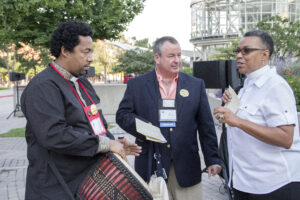
(l-r) the Rev. Lester Mackenzie, Dent Davidson, and the Rev. Gayle Fisher-Stewart at General Convention 2015 photo: John Craigle
Hayashi would be their host, presented an excellent opportunity for reaching leaders of the Episcopal Church as well as the general public with these priorities. Claiming Common Ground Against Gun Violence, as the Salt Lake City event came to be called, was designed by a liturgy committee chaired by Lee. Dent Davidson, the Diocese of Chicago’s associate for liturgy and music, worked with the Rev. Lester Mackenzie of the Diocese of Los Angeles to weave drumming, prayer, meditation, and moving testimonials together into a liturgy that lasted more than an hour as people processed from the convention center to a local park and back again.
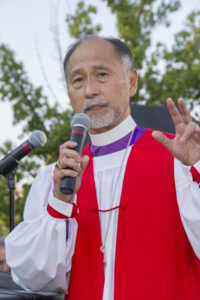
Bishop Scott Hayashi speaks to the crowd assembled in Salt Lake City at the 2015 General Convention. photo: John Craigle
The event drew 1500 people into the streets of Salt Lake City early on a Sunday morning. It featured music, prayer, and speakers, including parents of murdered youth, and a speeches by the Rev. Gayle Fisher-Stewart, a former police officer from the Diocese of Washington; Hayashi, whom many participants did not realize was a survivor of gun violence himself; Carolyn Tuft, the survivor of a local mass shooting; and Bishop Michael Curry of North Carolina, who had been elected the church’s presiding bishop the previous day.
The procession was held just 11 days after a white supremacist murdered nine Black members of Emmanuel African Methodist Episcopal Church in Charleston, South Carolina during a Bible study. It was featured on several newscasts, and captured creatively by Deputy News, and other church videographers. The power of the event was such that in its aftermath the bishops added “the promotion of public liturgy such as processions, vigils and prayers services to commemorate the dead and inspire the living” and “spiritual support for those living with gunshot wounds, with grief, with fear and with the temptation of hopelessness” to the network’s priorities.
The 2015 General Convention passed two resolutions urging the passage of stricter gun legislation, but Congress did not respond. Bishops United continued to draw attention to the need for such legislation, however, helping to promote the Wear Orange movement, which honors the life of Hadiya Pendleton, who was shot and killed on a Chicago playground in 2013. Members of Bishops United wrote a flurry of op-eds in major newspapers around the country, and a popular social media campaign helped boost gun violence prevention awareness across the church before the June 5 observance in 2016.
“Poll after poll demonstrates that some 85 percent of Americans, including large majorities of gun owners and members of the National Rifle Association, favor background checks on all gun purchases, yet Congress won’t act,” Beckwith told Episcopal News Service. “We need to take every opportunity to illustrate just how widespread the support for this simple legislation really is.”
Unholy Trinity: Chicago, April, 2017 and Austin, 2018
After the election of Donald Trump as president in 2016, the possibility of passing gun violence legislation at the federal level all but vanished, and Bishops United shifted some of its energies to state and local advocacy and educational efforts.
In April 2017 the group sponsored Unholy Trinity: the Intersection of Racism, Poverty and Gun Violence, a conference at the Lutheran School of Theology in Chicago. The gathering attracted participants from 37 dioceses and included a “three-note” presentation by the Very Rev. Dr. Kelly Brown Douglass, author of “Stand Your Ground: Black Bodies and the Justice of God,” who had just been named dean of Episcopal Divinity School; the Rev. Julian DeShazier, senior pastor of University Church at the University of Chicago, who also is a hip-hop musician known as J.Kwest; and Natalie Moore, a Chicago-based public radio reporter and author of “The South Side: A Portrait of Chicago and American Segregation.”
Over three days, participants took part in Bible studies; heard the testimony of a high school student
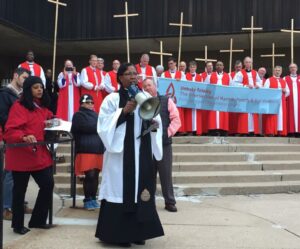
Just a week before becoming bishop of Indianapolis, the Rev. Jennifer Baskerville-Burrows spoke at a public witness at the Unholy Trinity conference in Chicago in 2017. At left, future Bishop of Chicago Paula Clark (in a red coat), listens.
who had been shot five times; participated in workshops on working with organizations ranging from youth groups to evangelical Christians; staged an outdoor liturgy that included a procession through Hyde Park’s streets; shared resources and learned how to practice Bishops United’s signature attention-getting outdoor liturgical services.
Participants included 25 bishops, members of grassroots organizations, such B Peace for Jorge, the Diocese of Massachusetts’s anti-violence program which honors Jorge Fuentes, a youth leader who was murdered in 2012; and rising leaders of the anti-gun violence movement including Lucy McBath, who now represents Georgia’s 7th Congressional District in the U. S. House of Representatives.
Before participants returned to the places where they would resume their work against the unholy trinity, Bishops Douglas of Connecticut and Audrey Scanlon of Central Pennsylvania led them in a prayer “for all who struggle to discern what is right in the face of powerful political forces.”
At the 2018 General Convention, Bishop United gathered each day at the convention center in Austin, Texas, for five-minute “pop-up” liturgies that included prayers for victims of gun violence. Those services were streamed on Facebook and attracted a sizable viewership, as did a large public liturgy in a park across from the convention center.
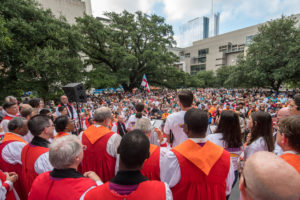
A crowd assembled at General Convention 2018 in Austin, Texas, to hear April and Phil Schentrup speak. Photo: Merrick Ales
At the liturgy, Episcopalians Philip and April Schentrup, whose daughter Carmen was one of 17 students and educators murdered that February in the mass shooting at Marjory Stoneman Douglas High School in Parkland, Florida, offered an emotional presentation on their ordeal, and Abigail Zimmerman, then a ninth-grader from Waco, Texas, spoke about leading a walkout at her school on March 14 in response to the Parkland shootings. Young people have “grown up as shooting after shooting after shooting have plagued our country and we have had enough gun violence,” she said.
In the course of responding to a steady stream of violence, Bishops United developed a collection of prayers for the Resources page of the group’s website including A Litany in the Aftermath of Gun Violence by Bishop Steve Lane, formerly bishop of Maine; and Litany in the Wake of a Mass Shooting, by the Rev. Kathleen Moore, now of St. John’s, Oakland, California, and a senior consultant with Canticle Communications, which was featured in a front page story in The Washington Post. The Litany in the Wake of a Mass Shooting includes incidents in which four or more people have been killed, and perpetrators are included in the prayers if they are among the dead.
In late 2018, Bishops United had its first leadership transition as Miller and Bishop Daniel Gutiérrez of the Diocese of Pennsylvania succeeded Beckwith and Sutton as two of the network’s three co-conveners. Douglas continued as the third co-convener, and Beckwith assumed a new role as the network’s liaison to the wider gun violence prevention movement. Among their other responsibilities, co-conveners reach out to any bishop in whose diocese a large shooting has occurred to offer pastoral support and information about resources available through Bishops United and other sources.
Campaigning on Many Fronts: 2019-2021
With the possibility of federal legislation blocked, the struggle against gun violence intensified on the state level, and advocates explored other tactics to put pressure on gun manufacturers. In the Diocese of Western Massachusetts, Bishop Doug Fisher has helped to organize demonstrations outside the headquarters of Smith & Wesson in Springfield, Massachusetts. With the backing of Bishops United, he has also led the general church’s efforts to use shareholder engagement to induce recalcitrant gun manufacturers to take greater responsibility for the damage their products do, a venture that has met with some success.
Bishop Jim Curry has garnered significant media attention in the northeast by using his forge to turn guns into garden tools. Numerous bishops have offered public testimony or written op-eds in the wake of mass shootings.
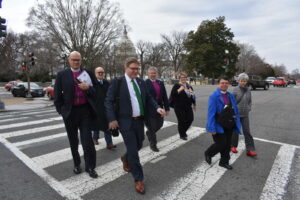
Jack Cobb of the Office of Government Relations leads a group of bishops that include retired Connecticut Bishop Suffragan Jim Curry, Connecticut Bishop Ian Douglas, Central New York Bishop DeDe Duncan-Probe and Washington Assisting Bishop Chilton Knudsen. Photo: David Paulsen/Episcopal News Service
In February 2019, the Episcopal Church’s Office of Government Relations arranged Congressional visits for eight bishops with their elected representatives on Capitol Hill. At the same gathering, the bishops met with leaders of major gun violence prevention organizations such as Brady, the Newtown Foundation, Everytown for Gun Safety and Guns Down America to strengthen their advocacy efforts. After stepping down as co-convener, Beckwith continued as the network’s liaison to the wider gun violence prevention movement, and he helped organize these meetings.
The network had planned a second gathering in Washington for the end of March 2020. When the COVID-19 pandemic hit, it was canceled and Bishops United faced new challenges in combatting gun violence. Gun purchases surged during the pandemic, and the co-conveners, with Beckwith, expressed their concerns with an op-ed for Religion News Service.
“Our agenda includes background checks on all gun purchasers, handgun purchaser licensing, restrictions on gun ownership by domestic abusers and safe storage of firearms,” they wrote. “Our country would be a safer place today if these policies were in effect. Yet in this moment of mutual need, we are troubled to find the National Rifle Association stoking fears of social disintegration to sell more guns.”
As the pandemic continued, Bishops United, like the rest of the church, employed Zoom to continue its mission, offering a service of lament, as well as webinars on the state of the intersection of racism and gun violence and on suicide prevention. The danger of proliferating gun sales was brought home in an especially heartbreaking way in June 2021, when a gunman murdered three members of St. Stephen’s Church in Vestavia Hills, Alabama.
A Few Steps Forward: 2022-23
In the years since Bishops United became a visible presence in the church, other Episcopal activists have also emerged to help lead the campaign against gun violence. St. Mark’s Church on Capitol Hill in Washington, D. C., which hosts meetings and services in support of the movement, has become a spiritual home for gun violence prevention advocates, and the Rev. Michele H. Morgan, the church’s rector, has become one of the movement’s most influential spiritual leaders. Each December, St. Mark’s hosts the National Vigil for All Victims of Gun Violence sponsored around the anniversary of the shootings at Sandy Hook Elementary School by the Newtown Action Alliance.
Bishops, clergy, and lay leaders have long been active on the state level, and that activity has intensified in the last few years. The Harrisburg Patriot-News credited Pennsylvania’s five Episcopal bishops with “leading a Christian movement to demand the legislature pass strong gun laws.” Their goals were summarized in a pastoral letter signed by all five of the state’s bishops, and in an op-ed by Bishop Sean Rowe of the Diocese of Northwestern Pennsylvania.
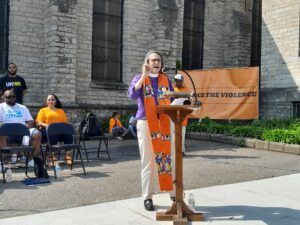
Bishop Bonnie Perry of Michigan leads Silence the Violence, a 2023 rally in Detroit.
In Michigan, Bishop Bonnie Perry, who succeeded Miller as a co-convener early in 2022, helped found End Gun Violence Michigan. The organization played a significant role in passing a flurry of gun violence prevention legislation after Democrats captured control of the governorship and both houses of the state’s legislature. In a single legislative session lawmakers made it more difficult for domestic abusers to gain access to guns; passed red flag laws, which allow law enforcement to temporarily confiscate firearms from people deemed a danger to themselves or others; established stricter background checks; and required the safe storage of weapons.
Even on the federal level, gun violence prevention legislation made incremental advancements. On June 25, 2022, President Joe Biden signed into law the Bipartisan Safer Communities Act, the most significant federal legislation to address gun violence since the 10-year assault weapons ban which expired in 2004. In September, Biden created the Office of Gun Violence Prevention, and in December he joined the annual Newtown vigil at St. Mark’s, Capitol Hill, becoming the first president to do so.
At St. Mark’s, the president spoke of his continued commitment to gun violence prevention legislation. But mass shootings and the steady drip, drip, drip of day-to-day violence continued. In May 2023, ten bishops gathered in Washington to meet with senators, representatives and their staffs to advocate for a ban on assault weapons and other legislative advances. The gathering was highlighted by presentations from local grassroots advocates, recruited by Budde, who spoke of the importance of confronting racism, poverty and neglect as factors driving the rise in gun violence.
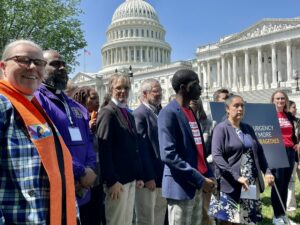
(l-r) The Revs. Michele Morgan and Ricardo Bailey and Bishop Mariann Budde of Washington and Bishop Ian Douglas were among the crowd at a gun violence prevention press conference called by Senator Raphael Warnock of Georgia on the lawn of the U.S. Capitol in 2023. photo: Jim Naughton
As the gathering concluded, the bishops were invited to a news conference called by Sen. Raphael Warnock of Georgia that included McBath, Sen. Christopher Murphy of Connecticut and Rep. Maxwell Frost, a survivor of gun violence and former national organizing director for March for Our Lives, which was formed by survivors of the Parkland shooting that took the life of Carmen Schentrup.
The Bishops United network, which has grown to include more than 100 bishops, was honored in a Statement of Support from the bishops of the worldwide Anglican Communion gathered at the 2022 Lambeth Conference, and mentioned prominently in analysis of the faith-based community’s efforts to curb gun violence. But it is perhaps some indication of the work that lies ahead that Bishop United’s public procession at the pandemic-limited 2022 General Convention in Baltimore was a short walk from the convention center to a site near where a young man had been shot to death the previous day.